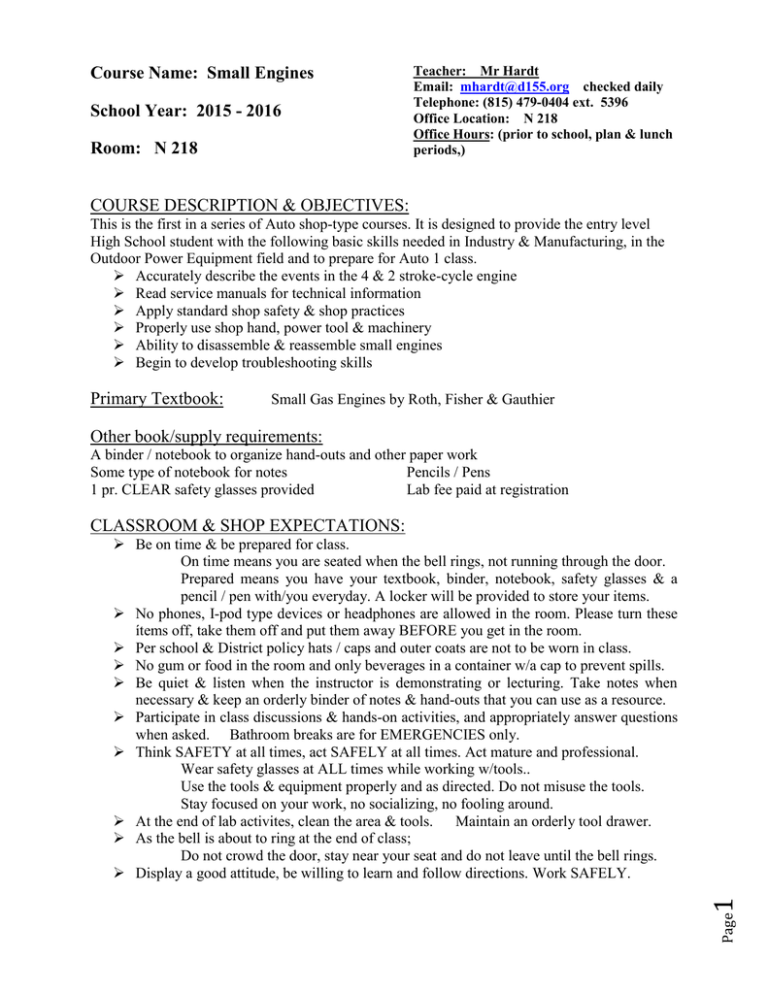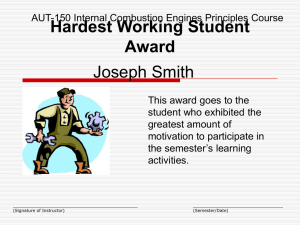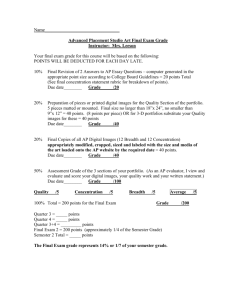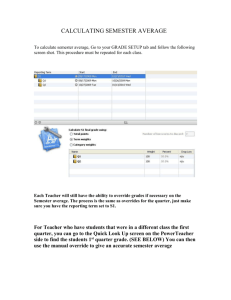Syllabus Template Sm Eng
advertisement

Course Name: Small Engines School Year: 2015 - 2016 Room: N 218 Teacher: Mr Hardt Email: mhardt@d155.org checked daily Telephone: (815) 479-0404 ext. 5396 Office Location: N 218 Office Hours: (prior to school, plan & lunch periods,) COURSE DESCRIPTION & OBJECTIVES: This is the first in a series of Auto shop-type courses. It is designed to provide the entry level High School student with the following basic skills needed in Industry & Manufacturing, in the Outdoor Power Equipment field and to prepare for Auto 1 class. Accurately describe the events in the 4 & 2 stroke-cycle engine Read service manuals for technical information Apply standard shop safety & shop practices Properly use shop hand, power tool & machinery Ability to disassemble & reassemble small engines Begin to develop troubleshooting skills Primary Textbook: Small Gas Engines by Roth, Fisher & Gauthier Other book/supply requirements: A binder / notebook to organize hand-outs and other paper work Some type of notebook for notes Pencils / Pens 1 pr. CLEAR safety glasses provided Lab fee paid at registration CLASSROOM & SHOP EXPECTATIONS: Page 1 Be on time & be prepared for class. On time means you are seated when the bell rings, not running through the door. Prepared means you have your textbook, binder, notebook, safety glasses & a pencil / pen with/you everyday. A locker will be provided to store your items. No phones, I-pod type devices or headphones are allowed in the room. Please turn these ítems off, take them off and put them away BEFORE you get in the room. Per school & District policy hats / caps and outer coats are not to be worn in class. No gum or food in the room and only beverages in a container w/a cap to prevent spills. Be quiet & listen when the instructor is demonstrating or lecturing. Take notes when necessary & keep an orderly binder of notes & hand-outs that you can use as a resource. Participate in class discussions & hands-on activities, and appropriately answer questions when asked. Bathroom breaks are for EMERGENCIES only. Think SAFETY at all times, act SAFELY at all times. Act mature and professional. Wear safety glasses at ALL times while working w/tools.. Use the tools & equipment properly and as directed. Do not misuse the tools. Stay focused on your work, no socializing, no fooling around. At the end of lab activites, clean the area & tools. Maintain an orderly tool drawer. As the bell is about to ring at the end of class; Do not crowd the door, stay near your seat and do not leave until the bell rings. Display a good attitude, be willing to learn and follow directions. Work SAFELY. Quarter Grade Calculation Weighting of homework, tests, quizzes, projects, classwork, class participation, etc. Late Homework Extracredit (if offered) Consequences for cheating Quarter Grade A+ A AB+ B BC+ C CD+ D DF Hi 100 97.49 92.49 89.99 87.49 82.49 79.99 77.49 72.49 69.99 67.49 62.49 59.99 Low 97.50 92.50 90.00 87.50 82.50 80.00 77.50 72.50 70.00 67.50 62.50 60.00 00.00 In progress grades are accessable by students and parents through our school website by clicking on the Skyward Online Grade Access button (lower right corner). Please contact your counselor if you’ve forgotten your log in and password. Semester Grade Calculation Grade reports are issued at the end of each nine-week grading period (or twice each semester). The semester grade, which is the only one that becomes a part of the student's permanent record, is based on a ratio of three grades: a first quarter grade, a second quarter grade, and a final exam grade to be calculated as follows: • 40% for the first nine weeks, • 40% for the second nine weeks, • 20% for the semester exam. Each quarter is an independent grade. The percentage or raw score for the first nine weeks is not averaged with the percentage or raw score for the second nine weeks to determine the semester average. In order to pass any course, a student must pass two of the three grades, and the student must take the semester exam. Cheating/plagiarism will result in a zero and/or more serious consequences. Makeup Policy: Make up privileges are for excused absences & suspensions only, not for class cuts or unexcused absences. Make up privileges are generally limited to written assignments. Extended absences are handled on a case-by-case basis. Late Work Policy: Late work is usually accepted for reduced value up to one week after the original due date, but assignments are expected to be completed on time. Page In the event you fail to prepare for a test and receive a less than satisfactory grade, you can relearn the material outside of class and re-take the test under the following conditions; Write a letter of apology to your parents and the instructor detailing what you failed to do in & out of class that resulted in the low grade and describing a very detailed action plan for what you are going to do in the future to prevent this from happening again. Take very detailed chapter(s) notes from the text & complete the textbook / workbook questions. Have these w/you when you re-take for reference. Prepare a very detailed PPT presentation on the topic area(s) and present it to the class. All requirements must be satisfactorily met by at least 1 week before the end of class in the grading period. It is recommended that you complete these requirements well in advance of the one week deadline in case you need to do additional work to get the items up to a ‘very detailed’ standard. Substandard work will not be accepted. This is intended to be a rare situation to re-learn material and not a regular occurrence to inflate grades. This policy can be altered if deemed necessary by the instructor. 2 Test Re-do Policy: Summative V Formative Grading: The expectation is that all work assigned will be completed to the best of your ability. You will learn & retain more if you do the work and you will be able to use these resources when you take the chapter tests. In general, practice homework & your notes / binder will be graded as a NO COUNT, it will be scored ( 3 ) for a good job, ( 2 ) for a fair job, ( 1 ) for poor job and ( 0 ) for not attempted. This way you can track your preparation for tests, as can your parents & instructor. Hold yourself to a mature & professional standard so you can learn & retain as much of the class content as possible. Make these NO COUNT opportunities work for you. Class Activities: Lecture, PPT’s, demonstration & discussion, textbook work, student presentations, written reports, work on class engines, repairs from home and school projects. Guest speakers & field trips as applicable. Tardy Policy: 1st and 2nd tardies – the student is given warnings to correct behavior 3rd tardy – 1 hour afterschool detention and parental contact 4th tardy - 2 hour Saturday detention and parental contact 5th, 6th, 7th & 8th tardies are STEPS 1 through 4 The student is dropped from class with an “F” on STEP # 4. Attendance and being on time is a ‘life skill’ necessary for future career success. Start practicing it now during High School so it will become a habit in adult life. Discipline Policy: 1st incident – 1 hour afterschool detention and parental contact 2nd incident – 2 hour Saturday detention and parental contact 3rd, 4th, 5th & 6th incidents are STEPS 1 through 4 The student is dropped from class with an “F” on STEP # 4. The instructor reserves the right to alter this sequence based on severity of the incident. You must conduct yourself in a mature & professional manner in a shop to prevent injury & tool damage. Follow all safety rules, stay focused on your work and do not fool around. BULLYING: Page 3 Bullying takes on many different forms and they are all unacceptable. Do not talk in an inappropriate manner to others and do not touch anyone in an inappropriate manner. If you feel you are being bullied, please tell a staff member ASAP so we can help you. 4 Page In order to be eligible to go on ‘Field Trips’ the student must meet the following criteria: Maintain a minimum of a “C” range grade from the start to finish of class. Do not have any missing work. Do not have any attendance or disciplinary issues. Must show the qualities of cooperation & respect with fellow students & the instructor. Must have demonstrated an ability to act in a mature & professional manner and to conduct oneself in a way that makes you a reliable representative of PRHS. SMALL ENGINES School Year 2015-2016 I have read and understand the course syllabus: Parent printed name: ________________________________________Date:______________ Parent Signature: ___________________________________________Date:______________ Student printed name : _______________________________________Date:______________ Page 5 Student Signature: __________________________________________Date:______________




